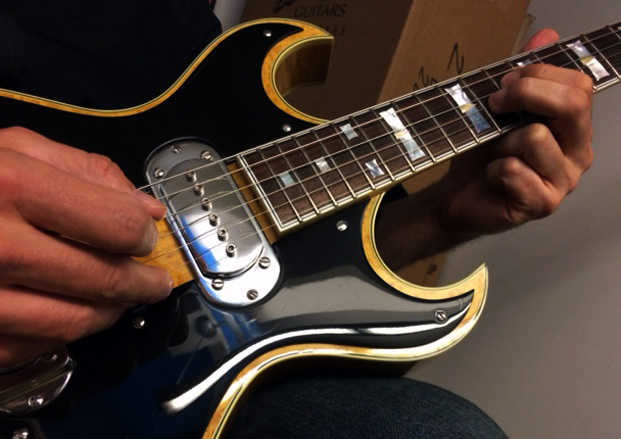Introduction to the Lydian Pentatonic Concept

One of the most common ways to expand your soloing ideas over maj7 chords is to explore the Lydian sound, which produces a maj7#11 chord.
While learning the Lydian scale itself is definitely one way to go when adding a maj7#11 sound to your solos, there’s another common and cool-sounding concept you can explore to bring this sound out in your lines.
In today’s lesson, we’ll be looking at how you can apply a major pentatonic scale a tone above any maj7 chord to bring out a Lydian vibe in your jazz guitar solos.
The Lydian Pentatonic Concept
Though it has a big name, the Lydian Pentatonic Concept is a rather easy way to bring out a cool, new sound in your jazz guitar soloing lines and licks. To break it down to its smallest form, the concept is as such: “Playing a major pentatonic scale a tone above the root of any maj7 chord produces a Lydian sound in your solos.”
Here’s how that concept looks with a Cmaj7 chord and D scale. When played over a Dmaj7 chord, the D major pentatonic scale produces the intervals: R-2-3-5-6 But, when you play this same scale, D major pentatonic, over a Cmaj7 chord, you produce a Lydian sound in your lines. 9-3-#11-6-7 As you can see, by playing a major pentatonic scale a tone higher than the maj7 chord you are soloing over, you are outlining a maj7#11 sound in your lines. This is a great way to bring out the Lydian sound in your solo, but not just run up and down the normal 7-note Lydian mode in your lines and phrases.
Lydian Pentatonic Concept Application
All the latest guitar news, interviews, lessons, reviews, deals and more, direct to your inbox!
Now that you know what the Lydian Pentatonic Concept is, let’s look at how the D major pentatonic scale sounds and looks when played over a Cmaj7 chord. As you will notice, though it is a major pentatonic scale fingering, when played over Cmaj7 the D scale takes on a whole new character, essentially giving you twice as much musical bang for your buck with this fingering.
I’ve written out a sample fingering I like to use for this scale, but feel free to use any fingering you like or prefer, as long as you play a major pentatonic scale a tone higher than the root of the maj7 chord you are soloing over the concept will work.

Now that we've checked out the theory background on this concept, let’s explore a sample lick and find out how you can apply this concept to a ii V I chord progression in your jazz guitar solos.
Lydian Pentatonic Concept Lick
To help you take this concept further in your studies, here is a sample lick that uses the Lydian Pentatonic Concept over the Imaj7 chord, in this case Cmaj7, during the last two bars of the phrase. After you've learned this lick in the given key, try taking it to all 12 keys, and then write a few similar licks of your own that use this concept over the Imaj7 chord.
Finally, put on a ii-V-I backing track, in one key to begin then in the other 11 keys from there, and solo over those changes using the Lydian Pentatonic Concept over each Imaj7 chord in your improvised lines and phrases.

Matt Warnock is the owner of mattwarnockguitar.com, a free website that provides hundreds of lessons and resources designed to help guitarists of all experience levels meet their practice and performance goals. Matt lives in the UK, where he is a lecturer in Popular Music Performance at the University of Chester and an examiner for the London College of Music (Registry of Guitar Tutors).
Matt Warnock is the owner of mattwarnockguitar.com, a free website that provides hundreds of lessons and resources designed to help guitarists of all experience levels meet their practice and performance goals. Matt lives in the UK, where he teaches Skype guitar students all over the world, and is an examiner for the London College of Music (Registry of Guitar Tutors).
